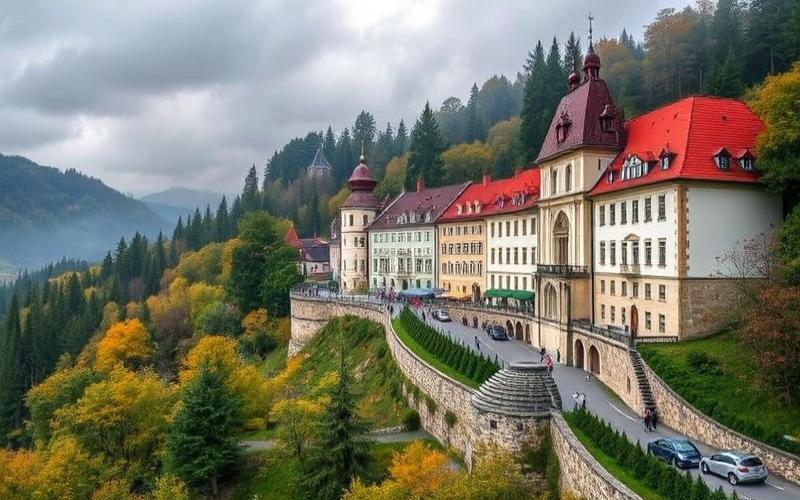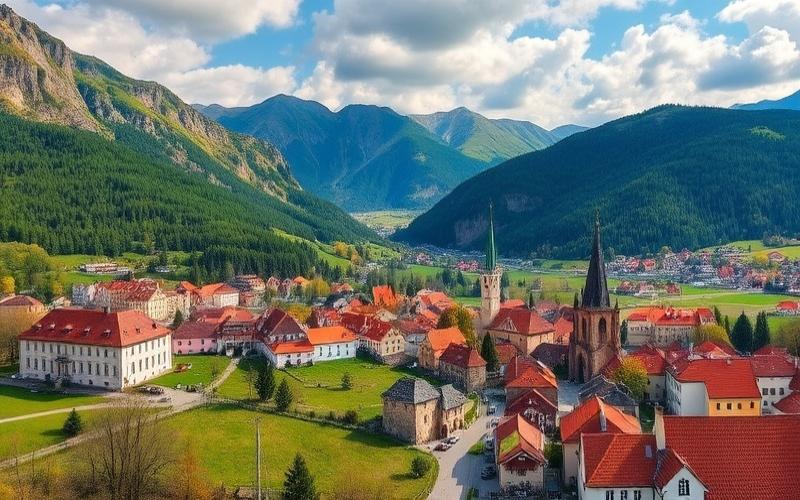
 Published on and written by Cyril Jarnias
Published on and written by Cyril Jarnias
Buying Agricultural Land in Poland
Buying agricultural land in Poland can be a profitable opportunity for foreign investors, given its strategic position in the heart of Europe and its growing agricultural sector.
However, before making this choice, it’s crucial to understand the legal complexities surrounding the acquisition of agricultural real estate in this country.
This detailed guide will provide you with essential information about current laws, procedures to follow, as well as specific restrictions that may apply to foreign buyers, enabling you to successfully navigate the purchasing process and optimize your investment.
Good to Know:
Poland imposes certain restrictions on the purchase of agricultural land by foreigners. It’s recommended to consult with a legal expert before finalizing any transaction.
Overview of Agricultural Land Purchase Laws in Poland
The Polish legislative framework governing agricultural land purchases is primarily based on the Act of April 11, 2003 on the Organization of the Agricultural System. This law aims to preserve agricultural land, limit speculation, and ensure that plots remain used according to their designated purpose.
Key Points of the Legislative Framework:
- Only individuals with agricultural qualifications (training or professional experience) who have resided for at least five years in the municipality where the land is located can acquire agricultural land. Companies engaged in agricultural activities may also purchase under certain conditions.
- A ceiling is set: a buyer cannot own more than 300 hectares of agricultural land.
- Sales of state-owned land are suspended for five years, with exceptions.
| Element | Detail |
|---|---|
| Duration of State Land Sales Suspension | 5 years |
| Ceiling per Owner | 300 hectares |
| Preemption Right | Agricultural Real Estate Agency |
| Exceptions | Churches/religious communities, inheritances |
Restrictions Applicable to Foreign Buyers:
- During the post-EU accession transitional period (until May 2016), foreign citizens were subject to restrictive rules.
- Since that date, only European nationals meeting all national conditions can purchase without a specific permit; for non-Europeans or special cases, a ministerial permit is still required.
Rights and Obligations After Acquisition:
- Obligation to actively farm the land according to its agricultural purpose
- Strict compliance with environmental regulations
- Declaration and registration with the centralized land registry
Specific Regulations for Rural/Protected Areas:
- Additional constraints regarding land use
- Prior obtaining of specific authorizations for any change of land use
Authorities Involved in Transactions:
- Agricultural Real Estate Agency (preemption right)
- Competent Ministry for Rural/Agricultural Affairs (permits for certain foreigners)
- Public notaries responsible for formalizing each deed
In Case of Rural Land Disputes:
- Possible referral to administrative/Polish courts
- Alternative avenues such as mediation or appeal to sectoral authorities
Good to Know:
In Poland, the purchase of agricultural land is governed by strict laws, and recent reforms have strengthened restrictions, particularly for foreign buyers who often need to obtain special authorization from the Ministry of the Interior. Landowners have specific obligations such as respecting agricultural land use and environmental conservation, especially in protected areas where regulations may be stricter. State agencies, like the Agricultural Property Agency, oversee these transactions and can be consulted in case of disputes. Additionally, mechanisms exist to prevent actions non-compliant with environmental regulations, ensuring that rural lands are managed sustainably. Owners also have rights, such as receiving fair compensation for expropriation in public interest projects. A clear understanding of this legislation is crucial for conducting a smooth transaction and securing your land interests in Poland.
Note: Any land transaction must strictly comply with Polish environmental protection regulations that may limit certain farming practices (e.g., pesticide use), require maintaining ecological infrastructure, or demand a preliminary study depending on the land’s location.
Risks Associated with Non-Buildable Land and How to Avoid Them
Purchasing non-buildable agricultural land in Poland involves several specific risks related to local regulations, development restrictions, and ecological implications. These factors directly influence the land’s value and its potential for future use.
Main Associated Risks:
| Type of Risk | Description | Potential Impact on Value and Use |
|---|---|---|
| Local Regulations | The acquisition is governed by the Act of April 11, 2003 on the Organization of the Agricultural System. Only qualified farmers or certain legal entities can purchase agricultural land under specific conditions. Special permits may be required for non-residents or foreign companies. | Restricted access for certain buyers; possible transaction cancellation if non-compliant; limitation to exclusively agricultural use. |
| Development Restrictions | Land use change (agricultural to buildable) is heavily limited, subject to strict approval by local authorities through local zoning plans (MPZP). It’s often impossible to obtain a building permit on these lands, except through official revision of the local plan. | Legal impossibility to build a house or commercial facility; reduced attractiveness for resale outside the agricultural sector. |
| Ecological Implications | Some plots are classified as protected areas (Natura 2000, sensitive natural spaces), prohibiting or severely restricting any transformation or intensive exploitation (limited use of fertilizers/pesticides, habitat preservation). | Significant loss of market value if the land is strictly protected; potential obligation for ecological restoration before use. |
Concrete Examples:
- A foreign investor purchases without verifying they have the required qualifications: the Polish regulator can retroactively cancel the purchase.
- An individual acquires a plot hoping to build a secondary residence but discovers the local plan prohibits any land use change—they’re left with land only usable for farming.
- A company buys a meadow located in a Natura 2000 zone without prior environmental audit: any intensive project will be denied by environmental authorities.
Practical Tips to Avoid These Risks:
- Systematically consult a legal expert specialized in Polish land law, particularly regarding:
- The criteria defined by the Act of April 11, 2003 (“Ustawa o kształtowaniu ustroju rolnego”).
- Obligations related to the “individual farmer” status.
- Request from the local municipal office (“urząd gminy”) an updated copy of the local zoning plan (MPZP) to:
- Precisely verify zoning and any restrictions in this public document.
- Confirm in black and white if future changes are feasible according to municipal objectives.
- Conduct a comprehensive environmental audit, especially when the land is located near:
- Wetlands,
- Forest areas,
- Or within Natura 2000/special protection perimeters,
- Identification of ecological constraints that could prevent any future modification/development;
- Anticipation of potential obligations from the purchase (specific ecological maintenance…).
- Refer to competent authorities, such as:
- The Polish National Center for Agricultural Support—Krajowy Ośrodek Wsparcia Rolnictwa (KOWR),
- The Regional Inspectorate for Environmental Protection—Wojewódzki Inspektorat Ochrony Środowiska.
Summary List – Key Laws & Agencies to Know:
- Act No. 64/2003 “Ustawa o kształtowaniu ustroju rolnego”
- Local Spatial Plan – Miejscowy Plan Zagospodarowania Przestrzennego
- Krajowy Ośrodek Wsparcia Rolnictwa
- Wojewódzki Inspektorat Ochrony Środowiska
⚠️ Before any purchase: it’s essential to obtain all this information in writing AND validated by an independent professional.
Good to Know:
In Poland, purchasing non-buildable agricultural land presents several risks, mainly due to strict regulations governing land use. Development restrictions imposed by local laws, such as the “Ustawa o ochronie gruntów rolnych i leśnych,” often limit possibilities to convert these lands into buildable plots, which can reduce their value. Moreover, ecological implications, such as protection of natural areas or wildlife habitats, can restrict land use. To avoid these pitfalls, it’s essential to consult legal experts specialized in Polish land law and verify local zoning plans to understand land use limitations. Additionally, a thorough environmental assessment will anticipate potential restrictions related to the local ecosystem. For example, land located in a protected area may be subject to strict environmental regulations preventing any form of construction. Finally, agricultural land acquisition must be carefully evaluated with advice from authorities such as the Polish Agricultural Property Agency (KOWR) to ensure compliance with current regulations.
Obtaining a Building Permit in Rural Areas in Poland
The legal framework for building permits in rural areas in Poland is primarily based on the Construction Law (Prawo budowlane) and, starting in 2025, on significant spatial planning reforms. Procedures and conditions differ depending on the type of land, location, and orientations of local plans.
Categories of Concerned Land
- Agricultural land (rolne)
- Forest land (leśne)
- Buildable land designated in the local spatial development plan
- Plots outside local plans, requiring an individual decision on development conditions (“decyzja o warunkach zabudowy,” known as WZ)
Steps and Administrative Procedures
- Verification of Land Status
- Consult the local zoning plan or request a WZ if the land isn’t explicitly intended for construction.
- Preparation of Documentation
- Gather all necessary documents: property title, architectural project complying with current technical standards (particularly minimum distances from boundaries), technical network opinions, etc.
- Submission of Application
- Submit the application to the competent municipal office (“urząd gminy”).
- Administrative Processing
- The administration verifies technical, urban planning, and environmental compliance.
Required Documents
| Document | Remarks |
|---|---|
| Property Title or Usage Right | Mandatory |
| Architectural Project | Must comply with recent standards (minimum distances: 3 to 5 m depending on configuration) |
| Cadastral Map | To precisely locate the investment |
| WZ Decision | If no local plan exists |
| Network Manager Opinions | Water, electricity… |
| Geotechnical Study | If required for certain constructions |
Conditions Influencing Approval
- Compliance with the new mandatory General Municipal Plan by end of 2025
- Respect for parameters imposed by new WZ rules: maximum intensity/bioactive/parking
- Strict consideration of minimum distances from cadastral boundaries
Average Timelines & Associated Fees
- Average timeline: between 1 to 3 months for a standard permit; longer if environmental consultation required
- Administrative fees: vary by municipality but generally range from a few hundred to one thousand PLN
Local/Regional Specificities
- Some rural municipalities may impose:
- Specific restrictions related to natural or cultural heritage,
- Annual quotas,
- Particular architectural requirements.
- Timelines may lengthen in tourist/protected regions or in case of local opposition.
Practical Tips to Facilitate Permit Acquisition
- Systematically consult a local urban planning expert before any rural land purchase
- Request an updated cadastral extract and verify any existing easements
- Hire an experienced Polish architect who masters new regulatory requirements since August 2024
- Strongly consider assistance from a lawyer specialized in Polish real estate law to secure all complex or contentious procedures
To maximize your chances: meticulously prepare your technical documentation from the start and maintain regular dialogue with your local administration.
Good to Know:
To obtain a building permit in rural areas in Poland, it’s essential to understand the legal framework that distinguishes buildable land from protected agricultural land under the Local Zoning Plan (MPZP). Administrative steps begin with verifying land buildability, followed by submitting the application to municipal authorities, accompanied by documents such as the architectural project and environmental agreement if required. Processing times vary but generally range between 30 and 90 days. Associated fees may differ regionally, often including a development tax. Local specificities, such as restrictions in certain zones or needs for consultation with neighboring owners, can influence the decision. To maximize success chances, it’s advisable to consult a lawyer specialized in real estate law or engage a local expert familiar with regional regulations, who can anticipate obstacles and facilitate the process.
Disclaimer: The information provided on this website is for informational purposes only and does not constitute financial, legal, or professional advice. We encourage you to consult qualified experts before making any investment, real estate, or expatriation decisions. Although we strive to maintain up-to-date and accurate information, we do not guarantee the completeness, accuracy, or timeliness of the proposed content. As investment and expatriation involve risks, we disclaim any liability for potential losses or damages arising from the use of this site. Your use of this site confirms your acceptance of these terms and your understanding of the associated risks.


















































